Exploring the far reaches of Everspace with Rockfish Games' CEO
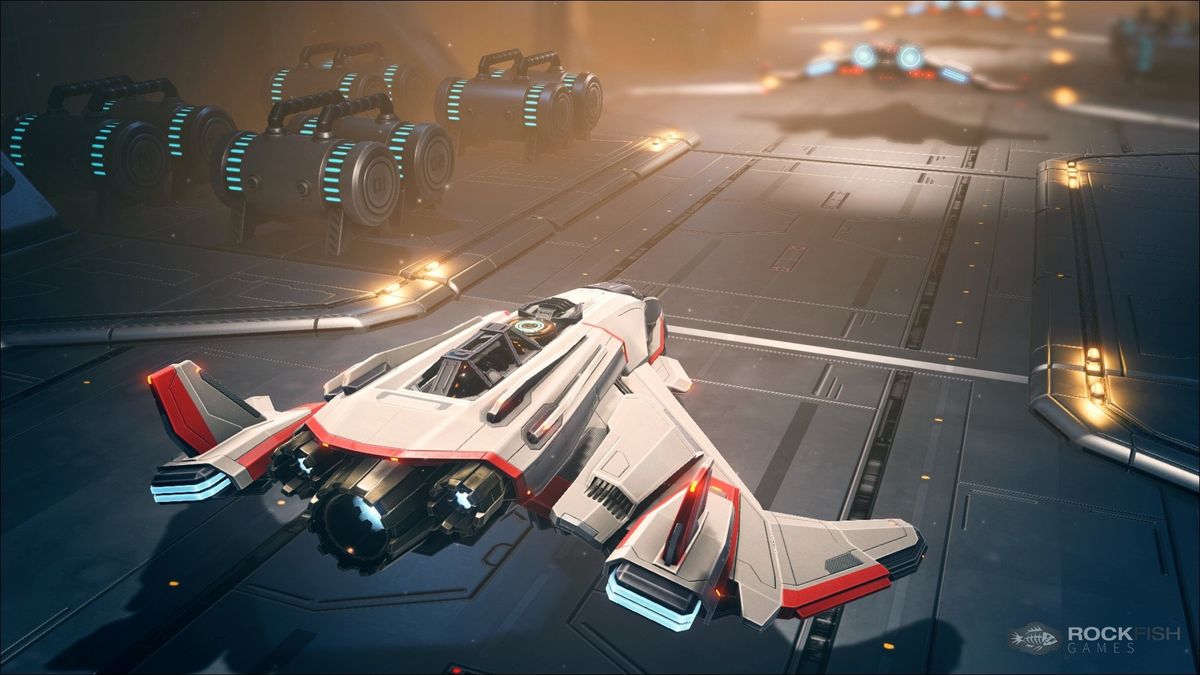
Last year, Rockfish Games debuted its latest project, Everspace, before surpassing its Kickstarter goal with profuse support. Shortly after the campaign closed, Microsoft scored a deal with the developer, locking down the title to the Xbox platform through its indie program, ID@Xbox. As a result of this arrangement, the rogue-like space shooter will now be seeing its console debut on Xbox One, alongside a simultaneous PC release on Steam and the Windows Store.
With a background in mobile development from its previous hit, Galaxy on Fire, Rockfish Games is moving into the console space with Everspace. The game takes on a unique approach to space battles, with game mechanics and controls which heavily emphasize fluid combat, unlike many recent space simulations. With an in-depth progression system, players must progress through the game's procedurally universe while uncovering a non-linear narrative.
Earlier this month at EGX Rezzed, we were given the opportunity to sit down with the CEO and co-founder of Rockfish Games, Michael Schade, to discuss Everspace's future on the Xbox One.
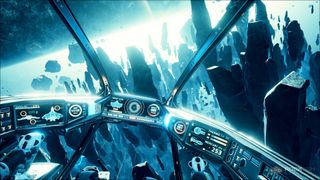
Matt Brown, Windows Central: So what would you say Everspace really is? On the surface, you may draw comparisons to Elite: Dangerous and Star Citizen, but they're clearly vastly different experiences.
Michael Schade, Rockfish Games: We tried to make Everspace more accessible compared to these true space sims that are super realistic, with real physics and such. And as you can see, we have controls which you might be more familiar with if you're playing shooters.
Things are, I'd say, a little bit more intuitive, and the depth of the game is within the damage and the upgrades systems of the game. So while it's easy to pick it up, fly around [and] shoot stuff, you see there's more coming if you upgrade your ship and have to deal with damage you take during your runs.
Matt: Will Everspace offer a developed upgrade and progression system?
Get the Windows Central Newsletter
All the latest news, reviews, and guides for Windows and Xbox diehards.
Michael: So we do have some long term progression. Because this is a rogue-like game, if you die you lose your short-term progression. So that's all the resources that you collected, all the upgrades you did while you are at a run. But if you die, you start from the carrier and then you can use blueprints, and blueprints are kept, so you won't lose [them] if you die. Then you can upgrade to a bigger engine or even change the ship (we have three ships in total) and then you fly out again and try to get to the final destination.
This is the only thing we give you at the beginning of the game, so we don't tell you who you are and what this is all about. You have to find out about this and every time you die, there's a memory flashback (a snippet of the story) and you understand eventually how the pieces are fitting together.
Matt: So you're trying to build a story around the rogue-like mechanics?
Michael: Yeah, which is unusual. And of course it's a challenge because you're constantly dying, but I think we find a nice way to tell a story. And even the characters that you meet within your runs, since everything is procedurally generated we roll the dice every time, there is a random factor [to] where and if you meet certain characters. They all have their little stories and those stories are interwoven with each other. For instance, if there's a trader [and] if you kill [him], he's gone and he's not going to come back. And maybe it's a good idea to help the trader because later in the game, you need some high-power weapon or exo-shields and such. So we tried to even those things. How you engage with characters in the story to be more meaningful than just completing the story.
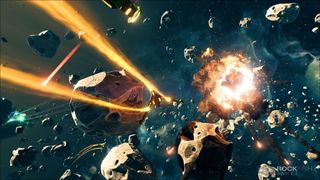
Matt: Does that mean that decisions that you make will influence your experience?
Michael: To an extent, it does influence your experience. The outcome of the story, that will be the same, so we're not branching up the story like you have in Mass Effect or something, But the way you progress through the story, it's different where and when you meet characters, how you interact with them. Maybe you don't talk to them at all and just leave them alone and try to find your way through the galaxy by yourself.
Matt: When I first saw Everspace, the graphics and art style really stood out to me. Have you had inspiration from any other games or media?
Michael: Our lead technical artist has been really driving this and is behind all this vibrant color. He was inspired by Guardians of the Galaxy, so I would say this is where the inspiration is coming from (to have this very colorful, vibrant setting). We didn't want to go too much into details and photorealism (for budget reasons).
But again, since we have a background in mobile, we had to make things very colorful and high-contrast, so you can see things on a little screen. So it's a style we're familiar with, it's a style that we like, it's a style that our fans like and we thought we'd just take it to the next level since on PC and Xbox One we have much more horsepower to make this art style shine.
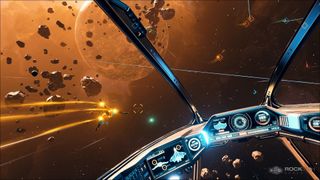
Matt: Everspace is a hugely open game that promotes player exploration. How large of a playable area can we expect?
Michael: Since it's a rogue-like game everything is procedurally generated; you could say the universe is infinite, but it takes about 10 to 20 hours to complete the story. And you will have seen roughly 200 locations. But every time you play the game, it'll be different locations. It's not like sandbox-wise we can say we have 2 billion planets or something to explore, so that's not going to happen.
Theoretically, we have more than that, but we wanted to make sure the locations you visit are really meaningful, that everything is very shiny, everything is very pretty. And we'd rather have 200 locations within one playthrough that are spectacular and everything, instead of having something I can play for 100 years and I haven't seen everything.
Matt: Are you looking at this being an experience where people will come back after completing the story?
Michael: At the end of the story there's a major event and then the game changes. There's still this open end, you can still get your achievements and so on, but the whole game world will change. Without spoiling too much, there will be other NPCs trying to achieve the same goal as you are and you have to fight them. Once you achieve that goal, obviously that goal is gone and then something will change for the whole world and you interact in a different way with those guys.
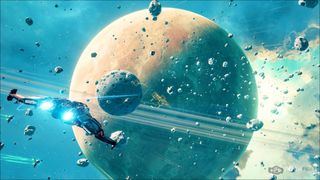
Matt: For your initial Kickstarter campaign, the game was only set to release for PC. What drove you to the Xbox platform?
Michael: We started off a Kickstarter campaign just for PC and had stretch goals for consoles which weren't unlocked. Microsoft reached out to us and said 'We love Everspace, we would like to help you guys to get on Xbox One so that Everspace has its console debut on Xbox One.' [But] further platforms are not ruled out.
Matt: So are you looking to support Windows 10 via the Windows Store?
Michael: The deal we have with Microsoft covers Windows 10 and Xbox One, and then Windows 7 through to Windows 10 will also be on Steam and GoG.
Matt: With a version for Xbox One and Windows 10, would you like to take advantage of features such as cross-platform saves and purchases?
Michael: Absolutely, we would love that. We're coming from the mobile space and we have these save games where you can play on your Mac, on your iPhone, on your iPad and continue the game. Obviously, we would love to have that for the PC and Xbox One version as well.
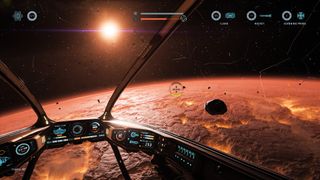
Matt: Are we going to see any differentiation between the PC and Xbox One versions, maybe due to hardware limitations?
Michael: Yes, of course. The response would be bad from our backers and it would be bad from our lead technical artist. He would jump right out of the window if we toned down the PC version just to have an easier life on consoles.
So there will be certain shaders, for instance, the parallax shader you just saw on the planet [example shown above]. You see, this is now really a very detailed shader that simulates the 3D emulation on that planet. So that's a parallax shader that's only on the PC. On Xbox One, we will have displacement maps, which still looks nice and has a 3D touch, [but] this sense of really deep craters and this three-dimensional surface here, that's only available on PC.
Matt: And actual gameplay-wise, will we see any differences?
Michael: That's identical.
Matt: So when can we expect Everspace to arrive on our consoles?
Michael: End of the year, that's what we have as our timeline, but again, Microsoft said it's not a good idea to come out at the end of the year, even if they support us with marketing. So we might rather look at a launch date in January or February next year.
We appreciate Michael putting aside his time to answer our questions!
For those on the PC, Everspace will soon be available to the public in an Alpha stage. As mentioned above, the final game's launch date is yet to be confirmed, but we currently expect a release during the early months of 2017.
To gain access to the Everspace Alpha, make sure to check out the official site below!
See Everspace Alpha package on the official Everspace site
Matt Brown was formerly a Windows Central's Senior Editor, Xbox & PC, at Future. Following over seven years of professional consumer technology and gaming coverage, he’s focused on the world of Microsoft's gaming efforts. You can follow him on Twitter @mattjbrown.
